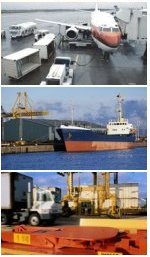

 |
 |
 |
Articles & Information<<Back to Articles/Information Index>> TOUGH ROAD TO OVERTURN A GARBAGE BIN (A DUMPING CASE)Schaefer, a Malaysian exporter of wheelie bins, has failed in the Federal Court to have dumping duties removed. The exporter had won five large Australian contracts for the supply of mobile garbage bins, predominantly to Australian councils. In response to this significant volume of imports that was occurring within a short space of time, Nylex Limited and another company Sulo lodged an application to Australian Customs for the institution of dumping duties. As per usual, the key issues were whether or not the Malaysian imports were being bought into Australia at dumped prices (i.e. below the normal value in the domestic Malaysian market) and whether or not local industry had suffered material injury as a result of the imports. The major issue in this case concerned whether material injury in fact had been caused by the imports. The Malaysian company argued that the contracts that they had won were on the basis of various other factors, such as the quality of the product and reliability and the warranty terms. Australian Customs conducted an extensive investigation which included interviews with a number of the councils that had awarded the contracts. Customs determined that the fact that the Malaysian company offered the lowest price was significant. Customs also found that the Malaysian product was not significantly superior to the Australian equivalent. Accordingly, Customs made a finding that dumping had occurred and that material injury had been suffered by the Australian industry in the form of reduced profits and price suppression in the relevant period. The Malaysian company launched a Federal Court action which, amongst other things, claimed that the Statement of Essential Facts from Customs omitted a number of facts arising from their interviews with local councils. However, the Court found that the Statement of Essential Facts was merely part of the statutory process and was a provisional document and, therefore, was not a definitive report to the Minister for Customs. The Malaysian company had also argued that the available evidence could not support the material injury finding because of the presence of other factors upon which the purchases were based. This raises the interesting question of whether the dumping caused material injury because, if the purchases were based on factors other than price, then the causal connection is unlikely to be made out. Here, the Federal Court found that the issue of causation is to be dealt with on a practical basis and that there was clearly sufficient evidence to show that price was an important factory. The conclusion to be drawn from this case is that it demonstrates that it is very difficult for importers to overturn a primary finding of dumping in circumstances where a thorough investigation has been undertaken. So long as local industry has provided to Customs sufficient statistical information to demonstrate selling at dumped prices (e.g. through overseas market surveys and ABS statistics, etc) and there is sufficient accounting information to demonstrate a trend in material injury, then these findings will be quite difficult to overturn unless there is compelling evidence to the contrary or significant errors in Customs’ reasoning. Ross Becroft, B.A., LL.B., M.Comm.Law (Melb) |
|
|
Home |
Our Services |
Our People The information you obtain at this site is not, nor is it intended to be, legal advice.
Copyright ©2007 by Gross & Becroft lawyers . All rights
reserved. |